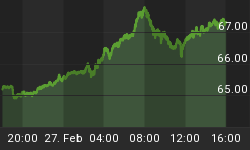In today's investment landscape, risk can come in all shapes and sizes. When structuring a stock portfolio most investors try to gauge the risk in buying particular stocks.
Savvier investors also factor in sector risk, business cycle risk, and recession risk. Cautious investors may try to mitigate these risks by favoring bonds over stocks. But even then they must contend with default risk, interest rate risk, and in the case of sovereign debt, political risk.
However, with central bank monetary policy now an increasing driver of economic outcomes around the world, there is one risk factor that deserves more attention:
currency risk. No investment, whether it be in stocks, bonds, real estate, or lemonade stands, can hold up well if the currency in which it is valued takes a tumble. It always surprises me that most US investors still fail to take currency into account, and in particular their potentially overweight exposure to the US dollar.
Many market watchers have justifiably concluded that the spiraling debt crisis that is now underway could develop into a major currency crisis that starkly alters exchange rates. Rather than rising above the fray, the US dollar could be in the center of the storm - especially if its valuable reserve currency status becomes threatened.
The dollar, which many now regard as the ultimate "safe haven," may prove to be a trap for those investors who lack adequate currency diversification.
In the spirit of sharing our favorite dollar-alternatives, I recently sat down with Axel Merk, founder and president of Merk Investments, who is a well-known authority in the international currency arena today. That conversation resulted in a new report, entitled Peter Schiff's and Axel Merk's Five Favorite Currencies for the Next Five Years, which is now available for free public download at www.newcurrencyreport.com.
For years, both Axel and I have raised the issue of currency risk, and we both continue to educate investors on the value of currency diversification. Although we agree on the big issues, there are differences in how we see the strengths and weaknesses of various world currencies.
In the report, we contrast our views on such potential safe haven currencies as the Swiss Franc, Norwegian krone, and Australian dollar. We discuss in detail the potential collapse, or possible resurgence, of the embattled euro. And we also spend time evaluating the future prospects for the Chinese renminbi - a currency that both of us agree will play a dominant role in the 21st century global economy.
Since the fiat currency game is in the hands of governments, many of our most interesting disagreements stem from the different odds Axel and I place on government reform.
Have the Swedes had enough of the welfare state? Will Hong Kong switch from a US dollar peg to a yuan peg - or will the Hong Kong dollar one day float on its own?
Are left-wing parties more likely to pass punitive taxes in Australia or New Zealand, and if so, how will those issues affect their economies? No one knows for sure how these events will play out, but as investors, we have to act on the data as we see it - and sometimes even like-minds see it differently.
Fortunately, Axel and I have drawn similar conclusions about the macroeconomic picture.
We fundamentally agree on the absurdity of the status quo, which sees the US offering IOUs to the rest of the world in return for real products. After the dust settles from what could be a global currency realignment, we believe that a new faith in sound monetary policy may emerge, which could then lead to the reestablishment of gold as the ultimate international reserve asset. But since we believe one's assets should be invested, not simply kept "under the mattress," Axel and I will continue to invest in countries with strong national balance sheets, prudent central bankers, and better-performing economies. We generally agree as to which countries qualify for such laurels... but narrowing it down to our top five favorites can result in some interesting discussion.
Go to www.newcurrencyreport.com to download the report for free. It is fun reading, but it also contains our latest thinking on the currencies we consider worth exploring. In a world where gold is in the quadruple-digits and the S&P has downgraded US debt, we both feel it's high time every American consider diversifying his or her portfolio to mitigate currency risk. We hope this discussion gets your gears turning.
Subscribe to Euro Pacific's Weekly Digest: Receive all commentaries by Peter Schiff and other Euro Pacific commentators delivered to your inbox every Monday.
For a great primer on economics, be sure to pick up a copy of Peter Schiff's hit economic parable, How an Economy Grows and Why It Crashes.















